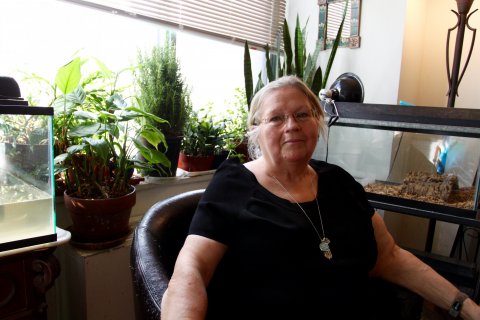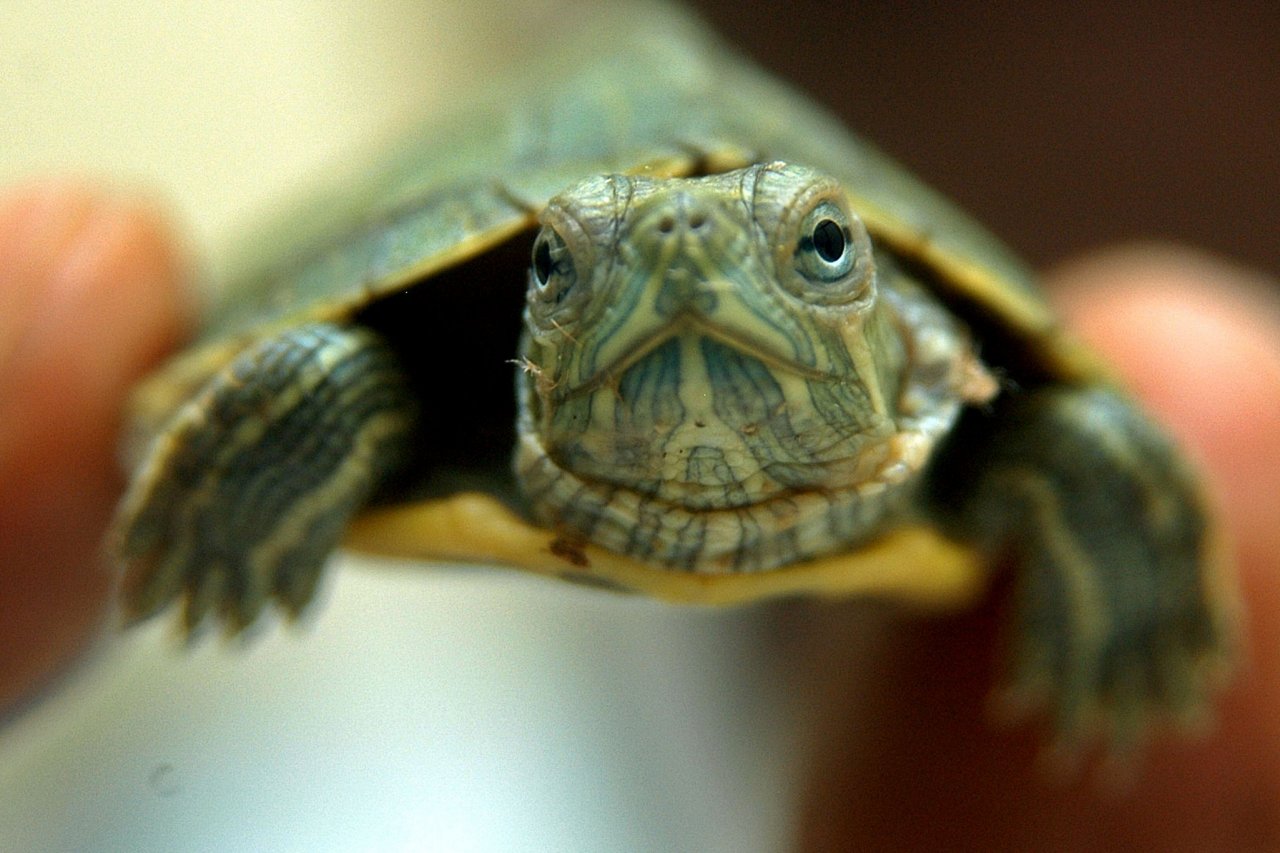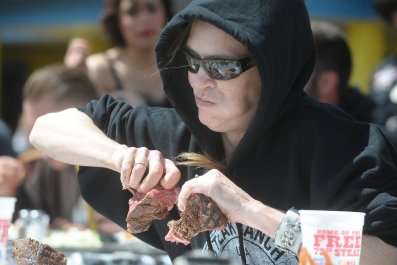Lorri Cramer opened the door of her Upper West Side apartment to find two handsome young officers standing in the hall, cradling three red plastic crates. The crates were marked "Fresh Litchi" (i.e., lychee), but a faint rustling sound came from within. They were teeming with baby red-eared sliders—652 of them.
The New York State Department of Environmental Conservation officers informed Cramer that the turtles had just been seized from a warehouse in Manhattan's Chinatown. Lacking the ability to care for the animals—and hoping to find an alternative to the usual procedure for dealing with confiscated baby turtles, euthanasia by freezing—the officers called Cramer, a state-licensed wildlife rehabilitator. Although she did not have the facilities or funds to keep the babies, she agreed to take them on.
"Sometimes I wake up and ask myself, What did you get yourself into?" says Cramer, who usually tends to up to 30 turtles—most of them recovering from an injury and waiting to be released back into the wild—in a small apartment shared by three cats, a dog and a husband. "But when the officers called, I said, 'I'm happy to try to help.'"
More than four weeks later, the hundreds of confiscated turtles are still in her spare bathroom (though over a hundred have died). Packed 200-deep in three water-filled containers, the babies claw at the slick plastic walls of their enclosures and topple over one another, seeking a way out.
Farmed in the millions in their native Southern U.S., red-eared sliders are shipped within the country and around the world, mostly to pet stores and Asian meat markets. Since 1975, however, selling baby turtles that are less than 4 inches long has been illegal in the U.S., because some reptiles—red-eared sliders included—can harbor salmonella on their skin. While red-eared sliders of any size can carry potentially deadly bacteria, cheap, adorable and seemingly low-maintenance baby turtles are the ones most likely to be purchased on a whim and given to very young children as pets.
The animals in Cramer's apartment—each about the size of a silver dollar—violate that law, which was established at a time when tiny sliders were America's favorite pet turtle and sold in practically every dime store in the country. But as salmonella infections broke out across the U.S., officials soon discovered that an estimated 14 percent of all salmonella cases traced back to baby turtles. Of those infections, the vast majority occurred in children under 5 years old—a group apt to put toy-like creatures into their mouth and not wash their hands. The 4-inch law still stands—and with good reason. A 2012 multistate salmonella outbreak that infected nearly 500 people was traced back to illegal-size baby turtles, as was the death of a 3-week-old infant in 2007.
Those caught selling turtles that violate the 4-inch law may receive a fine of up to $1,000, although if the turtles crossed state lines and their value exceeds $350, then the crime becomes a felony under the Lacey Act. This seems to be the case for Cramer's turtles. A closer inspection of the label on the crates in which the turtles arrived indicated that they came from Yi Bao, a produce company in California that could not be reached for comment, and that their ultimate origin was China.
Lacey Act violations can result in up to $250,000 in fines or five years in jail. For those caught trafficking in baby sliders, however, such a punishment "would never happen," says Edward Grace, deputy assistant director for the Office of Law Enforcement at the U.S. Fish and Wildlife Service. Instead, he says, first-time offenders typically receive a fine of around $2,000.
Even that meager punishment is rarely doled out, however. Only about 1 in 10 wildlife crimes are discovered, and fewer still ever result in prosecutions, mostly because of a lack of resources and funds to fight these wrongdoings. In addition, though baby turtles might not be as profitable as elephant ivory or rhino horn, they have a much lower profile. That means the odds of getting caught are low—and that when traffickers are caught, they are rarely penalized.
Meanwhile, criminals can sell baby turtles for up to 50 times what they paid wholesale. At $10 to $25 a pop, the babies in Cramer's possession have a street value of up to $16,300. "Really, turtles are just another high-profit resource that entails a low risk of getting caught or going to jail," Grace says. Illegal red-eared sliders are readily available for sale online, as well as in Chinatowns, pet stores, fairs and reptile shows across the country.

Cramer has politely turned down offers from several good Samaritans who expressed interest in adopting a few of the turtles. With their cartoon-like features and miniature proportions, baby sliders are undoubtedly adorable. But they grow quickly, eventually reaching the size of a dinner plate and requiring at least a 20-gallon tank. Like many turtles, red-eared sliders are also extremely long-lived creatures, often outlasting their human owners. Cramer knows of one red-eared slider that, at 87 years old, is now on its third set of humans.
Craigslist is peppered with ads for sliders—many in the 4- to 6-year age range, after the turtles have grown larger and require more care, and many offered for free. Cramer too encounters her fair share of desperate turtle owners. In a single three-month period last year, she received nearly 400 calls from people asking if she could take their red-eared slider off their hands. But as a rehabilitator who pays out of pocket for the animals in her care, she cannot act as a depository for unwanted pets. There's no real public solution either—only one state, Florida, offers a straightforward option for responsibly disposing of a cold-blooded friend.
Seeing no other way out, many slider owners release their turtles into the environment, even though letting any animal go without a permit is illegal in most states. Rogue do-gooders purchase turtles from food markets and also release them, while some Buddhists and Chinese believe that freeing caged animals—a practice referred to as fangsheng—gains them positive karma.
"When people at my congregation get sick, they contact the temple in China and the master there tells them to do release life," says Benkong Shi, an elder monk at the Grace Gratitude Buddhist Temple in Manhattan. Benkong often speaks out against the practice, which is alive and well in New York City. Temples report on release-life ceremonies in their newsletters, while shop owners throughout Chinatown openly display baby turtles. Spotting Benkong's robes, vendors frequently offer him baby turtles, insisting, "You can do release life!" He politely declines, and then reports them to the Department of Environmental Conservation.
Although the release-life ceremony is meant to be positive for the animal, the majority of released turtles likely do not survive. In Central Park's overcrowded Turtle Pond, where pet owners and Buddhists alike release animals, around half of the turtles—many red-eared sliders—die each winter from starvation and freezing. Come spring and summer, however, the pond is once again restocked with more illegally released animals. Other states, including Texas, California and Massachusetts, have also traced exotic animals found in the environment to release-life practices. In January 2011, for example, around 100 dead and dying sliders were discovered just steps from a Buddhist temple in Westford, Massachusetts.
"Those turtles did not have time to prepare for hibernation," says Thomas French, who runs the Natural Heritage and Endangered Species Program at the Massachusetts Division of Fisheries and Wildlife. "We want to be understanding and accommodating to religious customs, but we need to find a way that's first of all legal, and second of all doesn't involve a non-native species that is harmful to our environment."
Sliders that do manage to find their way into a suitable habitat at a suitable time of year often thrive. Aggressive, large and voracious, red-eared sliders are pond bullies; they easily outcompete many native turtles. They can also interbreed with several related subspecies of sliders found throughout the Eastern U.S., diluting those unique populations. "It almost looks like it might be too late for our big rivers and bodies of water," French says of his state. "These turtles compete with our native species, and we're especially concerned about our small, federally endangered population of red-bellied cooters." In January, French helped issue a law that makes it illegal to keep pond red-eared sliders as pets in Massachusetts, but adds, "Frankly, I wish we would have prohibited them in the pet trade 15 years ago."
Red-eared slider invaders can now be found basking in ponds not only in and around New York, Boston, Miami, San Francisco, Phoenix, Los Angeles and Portland, Oregon, but also in locations throughout every continent except Antarctica. "They've been introduced all over the place," says Pam Fuller, leader of the Nonindigenous Aquatic Species Program at the U.S. Geological Survey. "And I'm sure they're present in many other locations that we haven't recorded yet."
Cramer doesn't want to release her baby turtles anywhere—not even in their native range, in the Southern U.S.—because she fears that, given that they might have come from a farm in China, they could be carrying a foreign disease. While she could donate the babies to a turtle farm—the route French sometimes takes when he confiscates red-eared sliders—that would mean the animals would likely eventually be exported to Asia and eaten, an endgame Cramer finds unpalatable. Likewise, although she has received multiple "hate emails" instructing her to euthanize the invasive, illegal turtles, she will not consider that option either. "These animals have just started life and have not hurt anyone," she says. "I believe that a little turtle has as much a right to live as a dog or a person."
A creative solution might soon be at hand. Iris Ho, program manager for wildlife at the Humane Society International, and Benkong have taken up Cramer's case. In collaboration with the American Buddhist Confederation, they are working to find turtle sanctuaries in Southern states where the babies will first be monitored for any diseases and then allowed to live out their lives in enclosures. In preparation for the turtles' departure from New York, six monks and nuns blessed the turtles, and six donors from Benkong's temple and the American Buddhist Confederation gave a total of $2,000 in donations to help pay for the animals' transportation costs. In this way, the Buddhists receive their karma credit, the sanctuaries get paid, and the turtles get a happy ending.
In the meantime, Cramer continues to tend to the babies in her care. She has heard rumors that another large Chinatown turtle bust might be imminent—an event that could deliver hundreds of additional animals to her door. "I don't want to take in numbers like this ever again," she says. "But if need be, I would have to."















